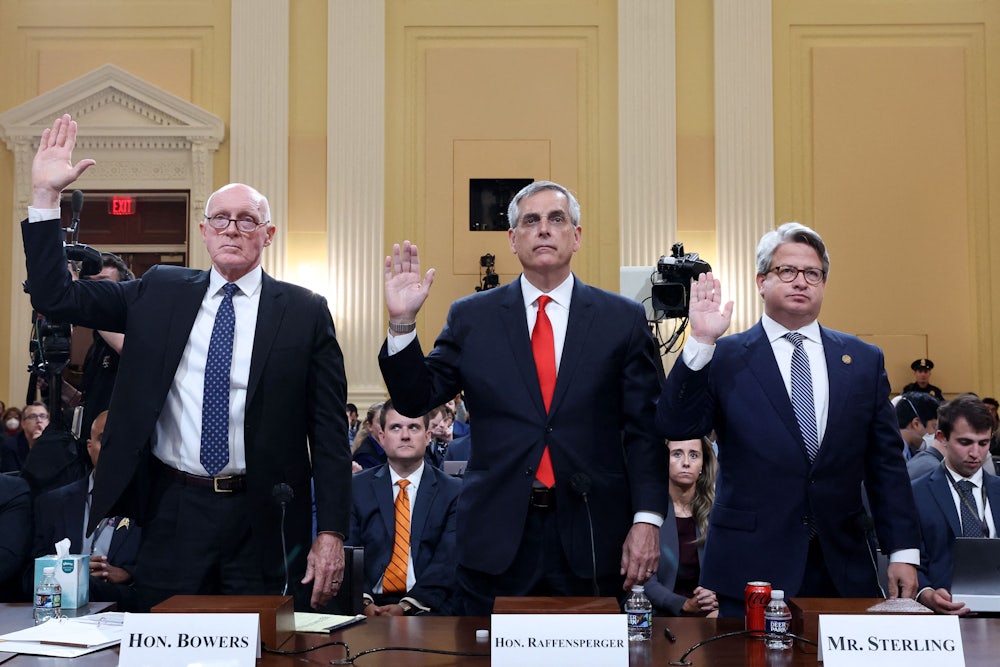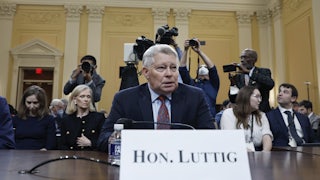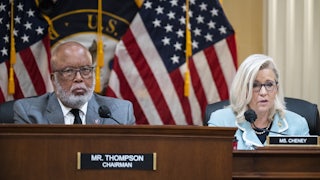The star of Tuesday’s fourth hearing of the January 6 committee was a ramrod-straight Arizonan, a grizzled figure who could play a retired sheriff in an old-time Western. Rusty Bowers, the Republican speaker of the state House, was there to talk about how he had repeatedly stood up to pressure from Donald Trump and Rudy Giuliani to overturn the 2020 election results and appoint a fake slate of electors.
“Look, you are asking me to do something that is counter to my oath when I swore to the Constitution to uphold it,” Bowers once responded to Giuliani, he told the committee. “And I also swore to the Constitution and the laws of Arizona.… You’re asking me to do something against my oath. And I will not break my oath.”
What makes a conservative Republican resist Trump and his deranged and fact-free election conspiracies? Where do political figures like Bowers and Georgia Secretary of State Brad Raffensperger, another witness, find their courage while the likes of Kevin McCarthy and Lindsey Graham become spineless Trump toadies?
That was the overhanging motif of Tuesday’s hearing. Raffensperger, whose smoking-gun phone call with Trump in early January 2021 was almost immediately leaked to the press, stood firm as the defeated president pressured him “to find 11,780 votes.” In Tuesday’s hearing, California Democrat Adam Schiff asked Raffensperger why, in the face of pressure from the White House, “didn’t you just quit and walk away?”
Raffensperger’s response was telling: “Because I knew that we had followed the law, followed the Constitution. But I think that sometimes moments require you to stand up and take your shots. You’re doing your job.”
Before Trump started lying about the outcome of the 2020 election, it would have taken the skills of Nostradamus to picture Bowers and Raffensperger as heroes of democracy.
Bowers had greeted Trump on the tarmac when Air Force One arrived in Phoenix in mid-February 2020, and later that day proudly bounded onto the stage at a reelection rally for the president. As for Raffensperger, he was a frequent target of Stacey Abrams, the 2018 and current Georgia Democratic gubernatorial nominee. After newly installed Dominion voting machines (later the stuff of bizarro Trump conspiracy theories) led to long lines during the June 2020 Georgia primaries, Abrams assailed the secretary of state for his “deliberate indifference to the needs of Georgia voters.”
In similar fashion, on election night 2016, the smart money would have been on up-and-coming young New York Representative Elise Stefanik, who got her start in the George W. Bush White House, as the sort of moderate Republican who would show gumption in battling Trump. At minimum, Stefanik would have displayed more independence than right-wing stalwart and torture-defender Liz Cheney.
But now Stefanik—who replaced Cheney after she was ousted from her role as the chair of the House Republican Conference—has gone so far to the nutcase right that she all but endorsed the loathsome “great replacement theory” after the Buffalo shootings. Cheney, in contrast, has become perhaps the fiercest adversary that Trump has ever faced. As the Wyoming legislator said at the beginning of Tuesday’s hearing, “I would urge all of those watching today to focus on the evidence that the committee will present. Don’t be distracted by politics. This is serious. We cannot let America become a nation of conspiracy theories and thug violence.”
Politics, especially when facing an authoritarian president, reveals character. Yet it is not as if you can psychoanalyze politicians from afar and instantly decide who has integrity and who will truckle to Trump.
There are clues, though. Bowers, Raffensperger, and Cheney all take the Constitution seriously rather than following Trump and his sycophants, who treat the country’s founding document like a real estate contract loaded with loopholes. Bowers, a Mormon, repeatedly referred to his religious faith as his main motivation. Raffensperger, who owns an engineering firm, takes arithmetic seriously. As he said at one point in the hearing, “The numbers were the numbers, and we could not recalculate.” And Cheney comes from a family that has never lacked self-confidence—and maybe, at the back of her mind, she remembers that her father, the future vice president, got his start in the post-Watergate White House of Jerry Ford.
It is important to make a distinction between these three stalwart Republicans and GOP figures such as Mike Pence and former Attorney General William Barr, who only briefly stood up to Trump at the very end by not explicitly breaking the law and not fostering the president’s efforts at staging a coup.
Even now, Pence does not have the gumption to repudiate Trump, a president who seems to have wanted him hanged from the gallows on January 6. The former vice president actually had the gall to claim to Fox News on Monday that he and Trump “parted very amicably.”
As forthright as Barr has been as a witness in his videotaped testimony (calling Trump’s stolen-election claims “bullshit”), he also served as a major Trump protector when he flagrantly mischaracterized the results of the 2019 Robert Mueller report. A Republican-appointed federal judge even suggested that “Attorney General Barr made a calculated attempt to influence public discourse about the Mueller Report in favor of President Trump.” And for all his frankness while under oath, Barr kept silent over Trump’s efforts to usurp democracy during the final days of his presidency. The former attorney general even gushed about Trump in his retirement letter.
There has been a tendency in the news media to rate the hearings based on whether hard-core Trump supporters suddenly see the error of their ways. Far better to wait to measure the hearings until they are over and base the political reaction on the sentiments of independents and weak partisans.
But there’s reason to hope a full public airing of the facts may produce some conversions. After all, Robert Sinners, a Trump campaign aide who worked to collect fake slates of electors in states that Joe Biden won, admitted in a video deposition, “We were just … kind of useful idiots or rubes.”
The hope is that the full slate of hearings helps convince the rational wing of the Republican Party that they were gulled by an orange-maned real estate hustler with contempt for democracy. They also underscore the character of conservatives like Bowers, Raffensperger, and Cheney, who got the message when it truly mattered.






